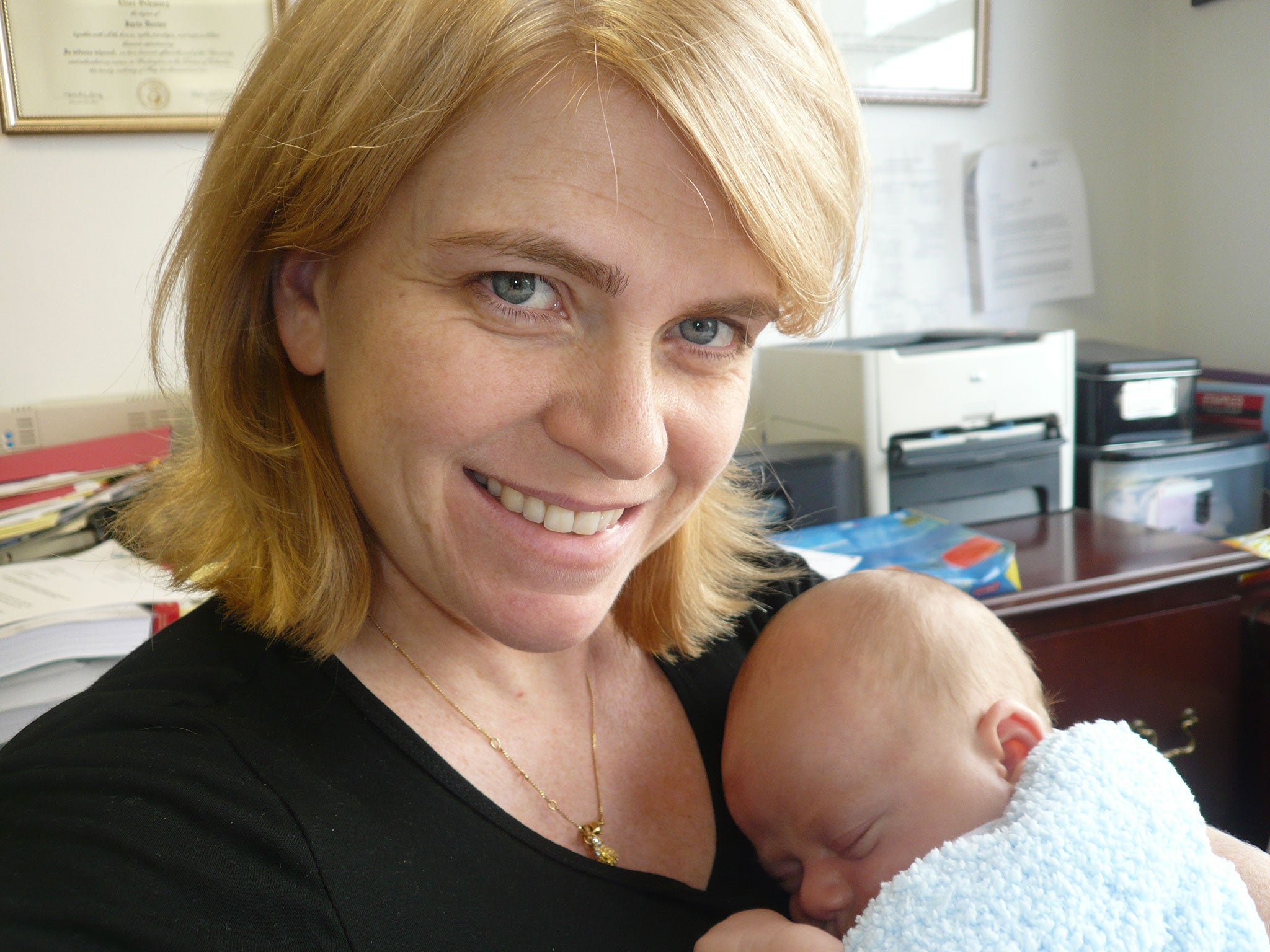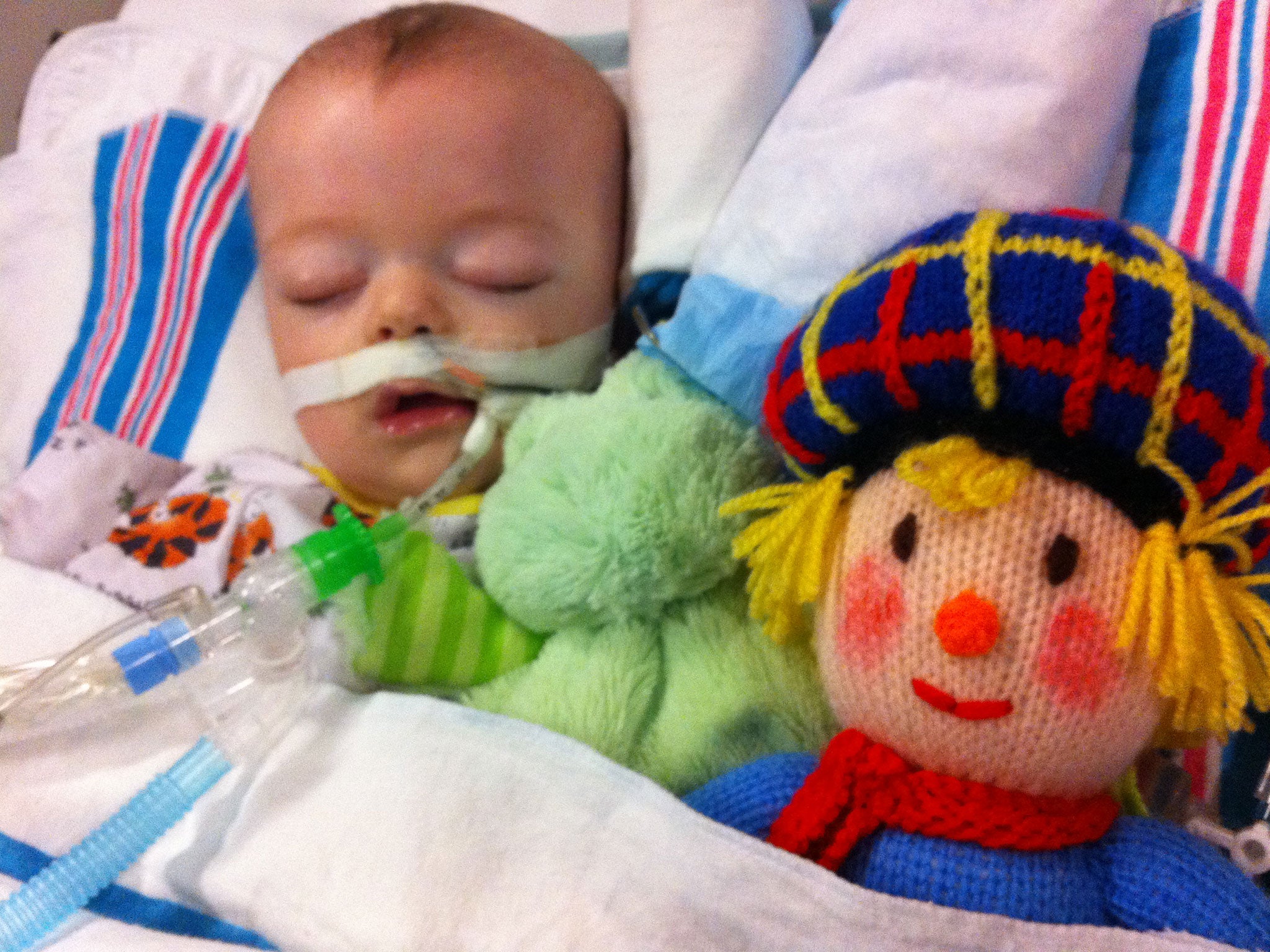Elise Schwarz: How a diary of my baby's short life kept me sane after I was accused of hurting him
Early on in Evan’s hospitalisation, a friend handed Elise a notepad and suggested she 'write it all down'

On 17 February 2012, Elise Schwarz’s life changed for ever. It was a Friday evening in New York and the weather was mild. She was on her way home from work when she checked her phone and saw a text message from her child’s nanny informing her that her five-and-a-half-month-old baby boy, Evan, wasn’t breathing.
What followed was two years of heartache, fear and frustration. Evan was diagnosed with shaken baby syndrome, a condition characterised by cranial injury and retinal haemorrhage, which is typically seen in babies who have been violently jolted or shaken. As a result, Evan suffered a massive brain bleed and a cardiac arrest. The evidence pointed to his nanny, Norma; but questions would also be asked of Elise, leaving her fighting for custody of her sick baby.
That fateful night, Evan was taken to the intensive care unit at Columbia University Presbyterian Hospital in New York, where Elise was living, although she grew up in Scotland. He was kept for a month before being moved to Blythedale Children’s Hospital in New York State. Nine months later, he moved – with Elise and a team of carers – into a Manhattan apartment for two weeks, before making the journey back to Scotland, where he lived for eight months in the Yorkhill Hospital in Glasgow (now called the Royal Hospital for Sick Children). Finally, Evan moved into his mother’s childhood home, which is where he spent the last six months of his life. Evan Louis Schwarz died on 21 February 2014, aged two-and-a-half.
Early on in Evan’s hospitalisation, a friend handed Elise a notepad and suggested she “write it all down”. Now, Elise has turned her diaries into a book that documents Evan’s journey. She says she found the process of writing therapeutic. “It stopped me from just going over the edge,” she says.
Elise, 45, grew up and went to university in Glasgow. At the age of 24 she moved to the US, living in San Francisco for five years before moving to Washington DC to attend law school. After graduation, she passed the New York bar exam and moved to New York City, where she decided to set up her own law practice. She had long wrestled with her sexuality and came out as gay when she was 31. Not long after this, she decided she wanted to be a raise a child on her own and, after 16 months of fertility treatment, she became pregnant with Evan.

But after Evan became ill, Elise gave up her law practice in order to stay by his side full-time. “Sometimes I miss it; I certainly don’t mourn it,” she says of her work. “I loved the way it allowed my mind to work. But I just miss Evan.” Elise describes Evan before his injuries as a “very placid baby” with “the most beautiful broad grin”. When she left him in Norma’s care at 8am on 17 February 2012, she says he wasn’t crying, “just smiling the sweetest smile”.
When she next saw him, Evan was comatose and he didn’t open his eyes for another three months. When he did open them, Elise says they were “lifeless”, and it wasn’t until Evan was 11 months into his hospitalisation that she began to sense he was no longer in a coma. He was also dependent on a ventilator and fed through a tube in his stomach until he died in 2014. His numbed face meant he couldn’t smile. Elise learned to read his heart monitor – an increased or decreased heart rate was often her only clue as to how her baby was feeling.
He made slow progress, but Elise celebrated each accomplishment, however small, and encouraged others to do the same, although this didn’t stop some doctors suggesting she withdraw care. “I kept life as positive as I could for Evan,” she says. “But I always thought I was hanging on by the skin of my fingernails and I felt that way for a year or so – just incredible fear, anxiety and terror.”
This would be torture enough for any parent, but Elise also had to deal with the fact that the Administration for Children’s Services in New York petitioned to have Evan removed from her care, despite neither the police nor the doctors involved considering her a suspect. For months, her son – who was fighting for his life – was in the custody of the state. This meant that had he been discharged from hospital, he would have had to go into foster care or to a long-term rehabilitation centre instead of home with his mother. Elise fought a lengthy and expensive battle to prove that she wasn’t responsible for Evan’s injuries, but it wasn’t until September 2012, eight months after Evan became ill, that the ACS finally withdrew the petition against her.
She is no longer angry with the authorities. “I never thought it was malicious; I thought it was incompetent,” says Elise. “There’s no point in feeling anger towards them. It wouldn’t help me, and certainly there was never a stage at which it would have helped Evan.”
Remarkably, she doesn’t even feel anger towards Norma, the nanny to whom she entrusted Evan’s care. Norma has never revealed exactly what happened on 17 February. When charges were eventually brought against her, she submitted to the court’s jurisdiction, accepting a finding of child abuse. As a result, her name was added to the central registry as a child abuser and she was banned from working with children for 28 years.
At the end of the book, Elise writes a letter to Norma that she doesn’t send, but which she says helped her find a level of acceptance. In it, she says that if she had to choose between being in Norma’s position and being Evan’s mum, she’d choose to be Evan’s mum every time.
“I’ve felt a lot of forgiveness, even without really knowing what it was exactly that happened,” she says now. “The ACS made everyone focus on shaken baby syndrome. In fact, two doctors missed vital warnings. It could be that Norma didn’t actually do anything, but if she did, it could be she did it in reaction to Evan not breathing – completely wrong, but not malicious. Of course, this all depends on my believing Norma did not act maliciously, which is what I want to believe. So if I have the luxury of that being an option, then it wouldn’t be kind of me not to feel sorry for her.”
Throughout the book, Elise comes across as a warrior mother, hell-bent on protecting her son. In conversation, however, she’s calmer, more resolved. The hanging-on-by-the-skin-of-her-fingernails stress is over. She no longer lives in fear because, she says, the worst thing that could have happened did happen.
Now, however, she’s dealing with cataclysmic grief, which is a whole new ball game. “Grief is a really isolating experience,” she says. “Even if two people are grieving for the same person.”
Fortunately, Elise has a rock-solid support network. Her siblings may be scattered across the globe (Cambridge, Madrid, San Francisco), but when Evan was ill, they all pulled together. Her brother arrived on a plane from San Francisco the morning after Evan was taken into hospital. Her sisters visited and prayed, and people took it in turns to sit with Evan in the hospital while Elise went to court or flew to Glasgow to visit her elderly mother.
Elise has fond memories of Evan’s time in Yorkhill Hospital and then later at home with her mother. She says returning to Scotland made her feel safe. Sense Scotland, a charity for people of all ages with sensory impairments, provided much-needed respite for them both. TouchBase, the charity’s special-sense facility, offered various art and music classes for Evan. “They normalised things for us and they made things fun,” says Elise. “And the people just loved Evan. I felt wonderful being there and you could tell Evan was really happy.”
Although Elise has not written the book specifically to raise awareness of shaken baby syndrome, she would be pleased if that did happen. What she really wants, more than anything, is for people who read it to think of Evan as the epitome of happiness and joy.
“It hurts me that people will think of Evan only as something awful that happened,” she says. “I want people to remember Evan and to remember how fantastic he was.”
Ultimately, the book is a mother’s tribute to her much-loved son. Elise’s relationship with her boy is front and centre of this story. “He’s absolutely the best thing that’s ever happened to me,” she says. “I certainly would rather be here, even though it’s without him, than have my old life if that meant never having him at all.”
‘I Believe in Evan’ by Elise Schwarz (John Blake, £7.99) is out now
Join our commenting forum
Join thought-provoking conversations, follow other Independent readers and see their replies
Comments